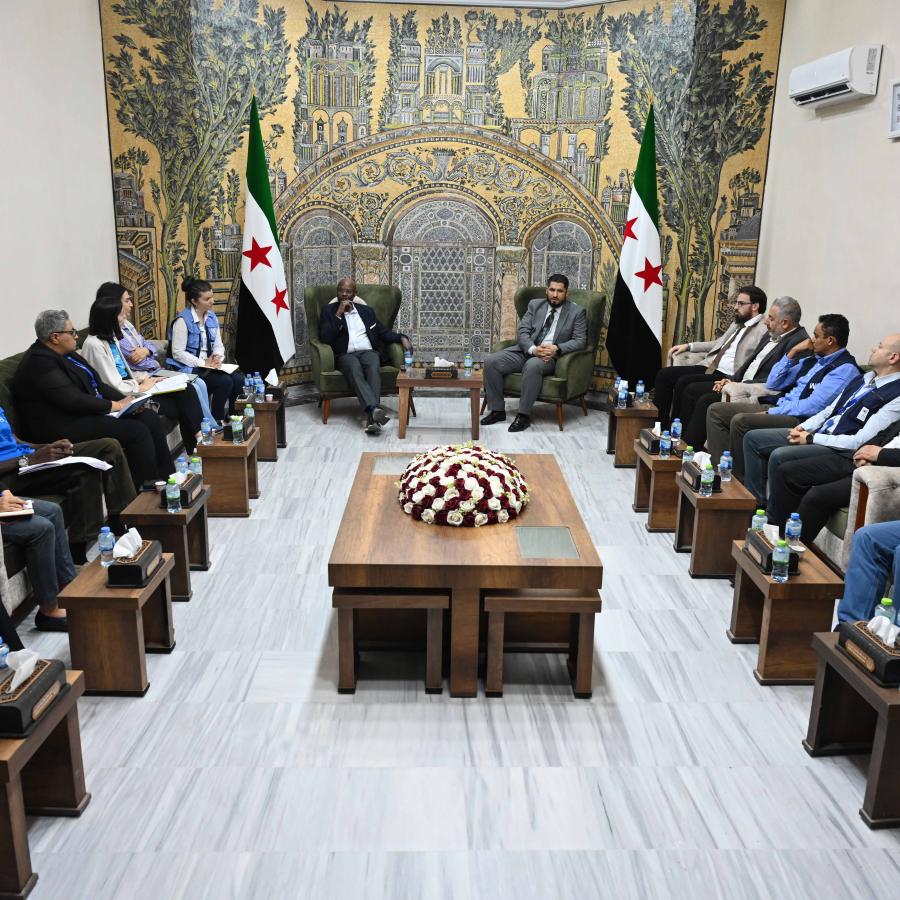UN Delegation Visits Aleppo and Idleb, calls for International Action to Support Syria
01 July 2025

Damascus, Syria, 1 July 2025 – A United Nations (UN) delegation headed by the Resident and Humanitarian Coordinator in Syria Adam Abdelmoula called for increased investment in Syria to meet the overwhelming needs of children and families following a two-day visit to Idleb and Aleppo Governorates.
The delegation met with the governors of Aleppo and Idleb, Mr. Azzam al-Gharib and Mr. Mohamed Abdel Rahman respectively to discuss priorities and explore ways to strengthen partnerships and cooperation to help Syria rebuild and recover from nearly 14 years of crisis.
It reiterated the UN’s commitment to support the Interim Government and the people of Syria at this crucial time.
The delegation also met with displaced communities and returnees from inside and outside Syria to learn more about the challenges they are facing, and the need to prioritise restoring livelihoods and basic services to ensure safe, voluntary, dignified, and sustainable returns.
“I have witnessed firsthand the immense needs of children and families, but I was also inspired by their resilience and determination to rebuild and recover from the years of war towards a better future,” said Mr. Abdelmoula. “The people of Syria deserve all the support the international community can offer and now is the time to act.”
Syria remains one of the world’s largest humanitarian crises where more than 16 million people are in need of humanitarian assistance. The country’s basic infrastructure was destroyed, disrupting the provision of essential services.
With the Humanitarian Response Plan for January to June 2025 only 15.9% funded, this gross underfunding could almost certainly have catastrophic results.
Under the leadership of H.E. Minister of Health, Dr. Musab Al-Ali, and the Governor of Idleb, the delegation participated in the launch of rehabilitation works at the Ma'arrat An Nu'man National Hospital. Supported by Hand in Hand for Aid and Development (HIFHAD), upon its completion, the hospital is expected to restore essential health services for more than 400,000 people in the area.
The UN delegation also visited Ma'arrat An Nu'man primary health care centre, which was rehabilitated by the World Health Organization (WHO) and partners, with support from GAVI, the vaccine alliance. It reopened in 2025 for the area, serving 100,000 people with primary health care, vaccination, emergency care, and maternity care with only one midwife attending to more than 100 births per month.
In Aleppo, the delegation visited Al-Hashmyee School, which had been out of service for over 10 years, and was rehabilitated by the United Nations Children’s Fund - UNICEF in 2022 and now provides inclusive quality education for 350 students.
It also visited Abdul Karim Najjar School, one of eight schools to be rehabilitated by the UN Joint Programme through collaboration between the United Nations Development Programme (UNDP), UNICEF and UN-Habitat.
With a budget of USD 18 million, the programme will reach over 150,000 people in eastern Aleppo between 2025–2026 by addressing multi-sectoral needs like energy, education, health, food, and jobs.
Health and educational systems have been severely strained by the conflict negatively impacting access to services. In Syria, over 2.4 million children are out of school and about 15.9 million people are in need of humanitarian health assistance in 2025, while 40 per cent of the country’s schools and half of its hospitals are non-functional.
“At this pivotal moment in the history, investing in the people of Syria means a brighter future for millions who have suffered greatly for a long time,” said Mr. Abdelmoula. “The people of Syria are looking upon us with open hands and hearts full of hope. We shall not let them down.”
The delegation was comprised of representatives from the Resident Coordinator Office, UN-Habitat, Food and Agriculture Organization (FAO), United Nations Populations Fund (UNFPA), WHO, UNICEF, UN World Food Programme (WFP), UN Refugee Agency (UNHCR), United Nations Office for the Coordination of Humanitarian Affairs (OCHA) and UNDP.
For media inquiries, please contact Tamim Elyan at telyan@iom.int
Before that, Ms. Fustier worked with the United Nations Office for the Coordination of Humanitarian Affairs (OCHA) in several leadership roles, including Head of Office in Lebanon and Gaziantep (Turkey), and Senior Humanitarian Affairs Specialist for the Middle East at UN Headquarters in New York.
Earlier in her career, she spent eight years in the private sector advising international companies in the Gulf and the Middle East on risk analysis, negotiation strategies, due diligence, fundraising, and intercultural training. She also served as the volunteer Chair of the Women’s Foundation for the Mediterranean.
For three decades, Ms. Fustier has worked on Middle Eastern affairs. She has served as Counselor for Cooperation and Cultural Affairs at the French Embassy in Doha, worked with the United Nations’ Oil-for-Food Programme and the Department of Political Affairs in New York, and served in the Office of the Special Representative of the Secretary-General in Baghdad. She also spent eight years in Paris overseeing the work of the Delegation for Strategic Affairs for the Middle East and North Africa.
Nathalie Fustier holds a master’s degree in political sciences from the Institute of Political Studies (Aix-en-Provence, France) and a master’s degree in international Negotiation from Aix-Marseille University (France).
She is married and has one son.








